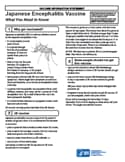Japanese Encephalitis VIS
Current Edition Date: 8/15/2019
- Print VIS [2 pages]
- RTF file [3 pages]
(For use in electronic systems)
- VIS in other languages
- More information about japanese encephalitis vaccination

Japanese Encephalitis Vaccine: What You Need to Know
Japanese encephalitis (JE) vaccine can prevent Japanese encephalitis.
- Japanese encephalitis occurs mainly in many parts of Asia and the Western Pacific, particularly in rural areas.
- It is spread through the bite of an infected mosquito. It does not spread from person to person.
- Risk is very low for most travelers. It is higher for people living in areas where the disease is common, or for people traveling there for long periods of time.
- Most people infected with JE virus don’t have any symptoms. Others might have symptoms as mild as a fever and headache, or as serious as encephalitis (swelling of the brain).
- A person with encephalitis can experience fever, neck stiffness, seizures, and coma. About 1 person in 4 with encephalitis dies. Up to half of those who don’t die have permanent disability (for example, brain damage).
- It is believed that infection in a pregnant woman could harm her unborn baby.
Japanese encephalitis vaccine is approved for people 2 months of age and older.
It is recommended for people who:
- Plan to live in a country where JE occurs,
- Plan to visit a country where JE occurs for long periods (e.g., one month or more), or
- Frequently travel to countries where JE occurs.
It should also be considered for travelers spending less than one month in a country where JE occurs, if they:
- Will visit rural areas and have an increased risk for mosquito bites,
- Are not sure of their travel plans.
Many laboratory workers at risk for exposure to JE virus will also require vaccination.
The vaccine is given as a 2-dose series. A booster dose is recommended after a year for people who remain at risk.
NOTE: The best way to prevent JE is to avoid mosquito bites. Your health care provider can advise you.
Tell your vaccine provider if the person getting the vaccine:
- Has had an allergic reaction after a previous dose of JE vaccine, or has any severe, life-threatening allergies.
- Is pregnant. Pregnant women should usually not get JE vaccine.
- Will be traveling for fewer than 30 days and only traveling to urban areas. You might not need the vaccine.
In some cases, your health care provider may decide to postpone JE vaccination to a future visit.
People with minor illnesses, such as a cold, may be vaccinated. People who are moderately or severely ill should usually wait until they recover before getting JE vaccine.
Your health care provider can give you more information.
- Pain, tenderness, redness, or swelling where the shot was given are common after JE vaccine.
- Fever sometimes happens (more often in children).
- Headache or muscle aches can occur (mainly in adults).
Studies have shown that severe reactions to JE vaccine are very rare.
People sometimes faint after medical procedures, including vaccination. Tell your provider if you feel dizzy or have vision changes or ringing in the ears.
As with any medicine, there is a very remote chance of a vaccine causing a severe allergic reaction, other serious injury, or death.
An allergic reaction could occur after the vaccinated person leaves the clinic. If you see signs of a severe allergic reaction (hives, swelling of the face and throat, difficulty breathing, a fast heartbeat, dizziness, or weakness), call 9-1-1 and get the person to the nearest hospital.
For other signs that concern you, call your health care provider.
Adverse reactions should be reported to the Vaccine Adverse Event Reporting System (VAERS). Your health care provider will usually file this report, or you can do it yourself. Visit the VAERS website or call 1-800-822-7967. VAERS is only for reporting reactions, and VAERS staff do not give medical advice.
- Ask your health care provider.
- Call your local or state health department.
- Contact the Centers for Disease Control and Prevention (CDC):
- Call 1-800-232-4636 (1-800-CDC-INFO) or
- Visit CDC’s JE website
Many vaccine information statements are available in Spanish and other languages. See www.immunize.org/vis
Hojas de información sobre vacunas están disponibles en español y en muchos otros idiomas. Visite www.immunize.org/vis
Vaccine Information Statement
Japanese Encephalitis Vaccine (8/15/19)
Department of Health and Human Services
Centers for Disease Control and Prevention
Office Use Only

